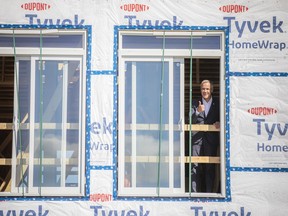Business
New Federal Housing Agency Aims to Tackle Crisis in Canada

Prime Minister Mark Carney announced the launch of a new federal agency, Build Canada Homes, aimed at addressing the ongoing housing crisis in Canada. This initiative will involve an initial investment of $13 billion to increase the construction of affordable housing projects nationwide, particularly in cities like Ottawa. The government plans to develop around 4,000 factory-built homes on federal land, with the potential for expansion to as many as 45,000 homes as demand dictates.
The funding will also allocate approximately $1 billion for transitional and supportive housing aimed at assisting low-income households. This effort will be carried out in collaboration with provinces, territories, municipalities, and Indigenous communities. Additionally, the $1.5 billion allocated to the Canada Rental Protection Fund is designed to purchase at-risk community rental apartment buildings and ensure their long-term affordability. This fund was first introduced by former Prime Minister Justin Trudeau as part of Budget 2024.
Carney emphasized the urgency of the housing situation during a press conference in Nepean, stating, “Young Canadians are doing everything right. They’re studying hard, finding a job, saving hard. Yet for too many of them, rent is unaffordable and home ownership feels entirely out of reach.” He noted that it typically takes nearly four years for first-time home buyers to save for a down payment, with markets like Toronto and Vancouver presenting even greater challenges.
Federal Housing Minister Gregor Robertson reiterated the need for increased non-market housing, pointing out the long-standing nature of the crisis. “The housing crisis has deepened over several decades, impacting communities across our country,” he said. “There’s not enough non-market housing to meet the needs. Home ownership has become unattainable for too many, and productivity in the sector is low, which is cramming up costs.”
As part of Carney’s campaign promises during the 2025 federal election, he committed to doubling the pace of housing construction and reducing costs for homes, rent, and mortgage payments. This announcement comes against the backdrop of rising housing prices in Ottawa. According to the Canadian Real Estate Association, the median sales price for a single-detached home in Ottawa reached $822,500 in the second quarter of 2025. For condos and townhouses, median prices were reported at $404,250 and $580,000, respectively.
Rental prices are similarly on the rise. A recent report from Rentals.ca and Urbanation indicated that the average advertised rent for a one-bedroom apartment in Ottawa has climbed to $1,997 per month, while two-bedroom apartments have averaged $2,540.
The announcement comes shortly after an auditor general’s report highlighted systemic issues within Ottawa’s development processes, which have contributed to delays in housing construction. Ottawa Mayor Mark Sutcliffe expressed enthusiasm regarding the new funding, stating that it would significantly enhance the construction of affordable and supportive housing in the city. “Anything we can do to build more homes, to accelerate the construction of homes, to build more affordable and supportive homes, is very positive,” he remarked.
Sutcliffe has indicated a willingness to collaborate with the federal government to expedite development opportunities, particularly on federal land within the city. While he did not disclose specific sites under consideration, he noted that there are promising possibilities for swift action.
Overall, the formation of Build Canada Homes and the associated funding signals a concerted effort by the federal government to confront the challenges of housing affordability and accessibility in Canada.
-

 World4 months ago
World4 months agoScientists Unearth Ancient Antarctic Ice to Unlock Climate Secrets
-

 Entertainment4 months ago
Entertainment4 months agoTrump and McCormick to Announce $70 Billion Energy Investments
-

 Lifestyle4 months ago
Lifestyle4 months agoTransLink Launches Food Truck Program to Boost Revenue in Vancouver
-

 Science4 months ago
Science4 months agoFour Astronauts Return to Earth After International Space Station Mission
-

 Technology2 months ago
Technology2 months agoApple Notes Enhances Functionality with Markdown Support in macOS 26
-

 Top Stories3 weeks ago
Top Stories3 weeks agoUrgent Update: Fatal Crash on Highway 99 Claims Life of Pitt Meadows Man
-

 Sports4 months ago
Sports4 months agoSearch Underway for Missing Hunter Amid Hokkaido Bear Emergency
-

 Politics3 months ago
Politics3 months agoUkrainian Tennis Star Elina Svitolina Faces Death Threats Online
-

 Politics4 months ago
Politics4 months agoCarney Engages First Nations Leaders at Development Law Summit
-

 Technology4 months ago
Technology4 months agoFrosthaven Launches Early Access on July 31, 2025
-

 Top Stories1 week ago
Top Stories1 week agoFamily Remembers Beverley Rowbotham 25 Years After Murder
-

 Entertainment4 months ago
Entertainment4 months agoCalgary Theatre Troupe Revives Magic at Winnipeg Fringe Festival



















